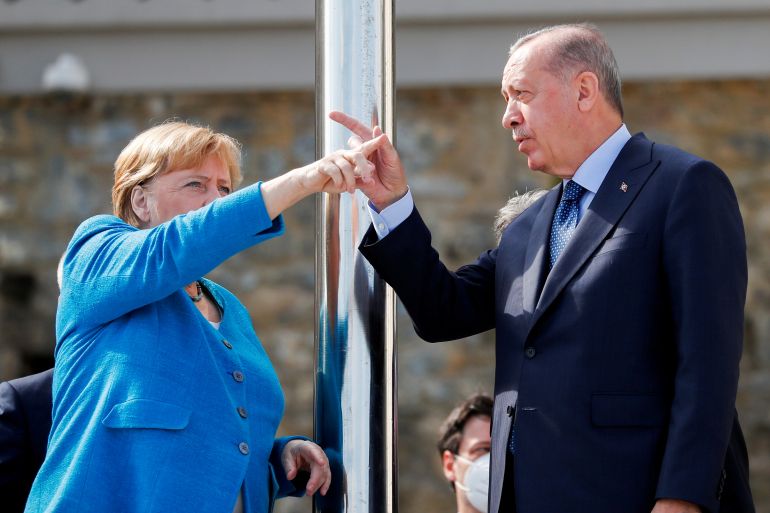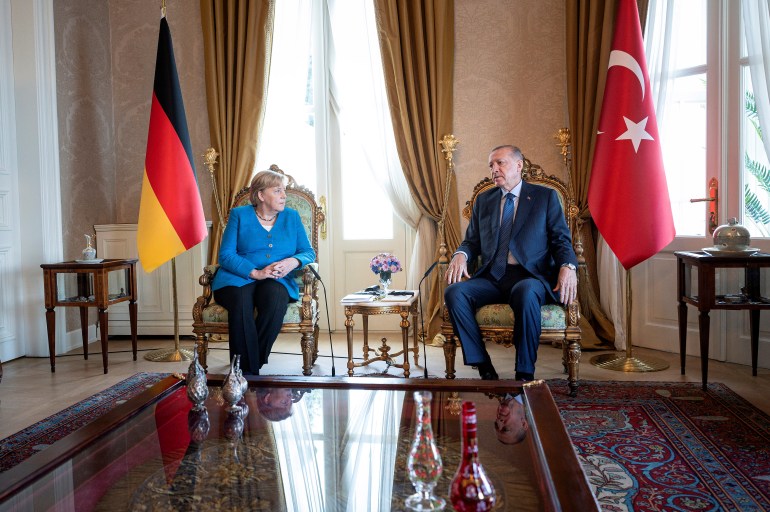Angela Merkel hopes Germany continues to work with Turkey
In a farewell visit to Turkey, the outgoing German chancellor says the security and independence of both countries depend on each other.

Istanbul, Turkey – In a farewell visit, outgoing German Chancellor Angela Merkel said her country will continue to maintain a working relationship with Turkey, stressed cooperation on migration and other issues, and defended Berlin’s diplomatic efforts at upholding human rights.
“The relationship between Turkey and Germany, with its positive and negative sides, will go on,” Merkel told reporters at a joint news conference with Turkish President Recep Tayyip Erdogan on the steps of Istanbul’s Dolmabache Palace. “Everybody knows the security and independence of both our countries depends on each other.”
Keep reading
list of 4 itemsTurkey: Erdogan central bank firing clears way for more rate cuts
Turkey urges engagement with Taliban after talks with group
Turkey says will do ‘what is necessary’ after Syria attacks
Erdogan said Turkey would “always remember the good faith and the contribution” Merkel made towards maintaining ties with Turkey.
“From prevention of irregular migration from Syria, to dispatching humanitarian aid to northern Syria, on many topics Merkel did not abstain from taking the initiative and taking responsibility,” Erdogan said.
Merkel’s party narrowly lost elections in Germany last month, and a new government will consist of a coalition that will likely be more centre-left, and likely more critical of Ankara than before.
Merkel, who led Germany for 16 years, and Erdogan, who has led Turkey for 19 years, are perhaps the most seasoned political leaders in the region. At times, Merkel has pushed for maintaining ties with Turkey despite pressure at home over contentious issues such as migration and human rights.
On Saturday the two briefly acknowledged the different styles of government the two countries have adopted.
“Sixteen years is not a short time, and I have been in power for more than 19 years,” Erdogan said when asked to compare the political acumen of Merkel.
“We have talked with and worked with many world leaders, and the chancellor was quite successful in administering Germany,” Erdogan said. “We will watch the developments of our relations, but without a coalition [in Germany] they could have been in a better place. It’s not easy to work with a coalition government.”
In 2018, Turkey began switching to a presidential system of government, handing more power to Erdogan’s office in what he said was an effort to do away with an unstable parliamentary system that was too susceptible to party politics and the need for coalitions.
Markel laughed off the suggestion from Erdogan to make such a change in Germany, saying she was focused on maintaining good relations with Turkey.
An important diaspora
Ankara and Berlin have particularly close ties partly because of the presence of millions of Turkish immigrants in Germany. This year marks the 60th anniversary of a landmark labour agreement that brought Turkish workers to Germany.
“There are nearly four million people of Turkish heritage in Germany,” Merkel said. “They are doctors, scientists, academicians, and their parents were the first immigrants.”
Turkish political parties, including Erdogan’s ruling Justice and Development Party, regularly campaign among the Turkish diaspora in Germany.
But the relationship has also meant developments in Turkey, especially concerning Erdogan, are closely followed in Germany, and human rights issues in Turkey – from freedom of the press to rights of minority Kurds to the secular nature of the state – have been discussed in Germany perhaps more than in any other European country.
German television comedians have faced investigations over “insulting” Erdogan over the years, and German journalists have faced criminal cases in Turkey for their work.
Turkey, which has long had aspirations to become a full European Union member, currently faces censure and possible suspension of its membership in the Council of Europe over its human rights record at home.
Asked about those human rights concerns, Merkel responded with the diplomatic flare that has come to mark her tenure, saying there was still work to be done.
“Sixteen years were not enough to solve these issues, but we have accomplished many things,” Merkel said. “We have to speak about these issues and we try to find solutions. Sometimes we have very different ideas, but at the core, I can say when we talk we come to the best results.”

‘Cooperation on migration to continue’
Over the last few years though, dialogue between the two countries has largely been taken up by the issue of refugees and migrants, millions of whom have made their way through Turkey, heading west in an effort to settle in the EU.
Turkey has repeatedly said it would like European governments to do more to stem the flow of migrants. In 2016, Merkel pushed through a deal between the EU and Turkey that would deliver 6 billion euros (about $7bn) in exchange for Turkey hosting that tide of refugees and migrants.
Over the years, Erdogan has complained that funding has not reached Turkey, and at times has threatened to lift obstacles to migration to the EU altogether.
Turkey’s concerns over migration have again come to the forefront in recent weeks over fears of a new wave of Afghans fleeing instability in their country.
Merkel said despite that tension, she hoped support given to Turkey by the EU would continue, and more of the promised funding would reach Ankara.
“Turkey has undersigned many projects on the issue of migration and we have been cooperating against human trafficking,” she said. “Together with the UN, we have already and will work to prevent a further humanitarian crisis in Afghanistan.”